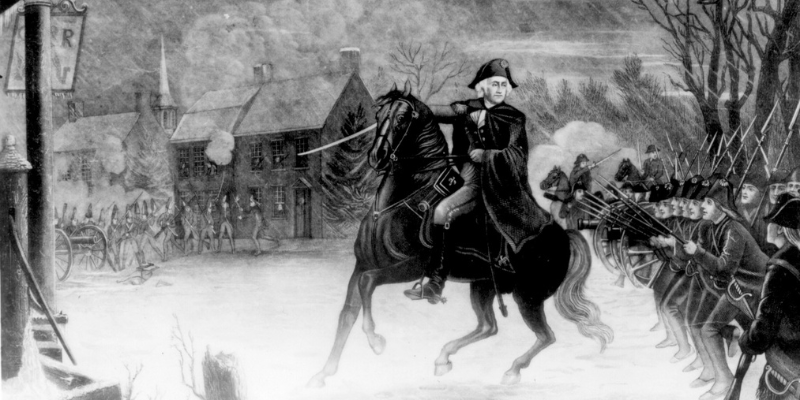
By Denis J. Cooke
Captain John Lacey arrived home to Bucks County (Buckingham Township) from Fort Ticonderoga on December 1, 1776. His year- long enlistment in the Continental Service was ending and the experience had left a very bad taste in his mouth. In his memoirs, Lacey describes in detail how he and his commanding officer, Colonel Anthony Wayne, had engaged in a clash of wills, and he came home determined to resign from the Army.
Catching up on the latest news on his arrival home, Lacey wrote, (original spelling and grammar maintained) “I was however, greatly alarmed on finding the Enemy had persued Genl Washington to Trentown in the state of New Jersey where they had gone into Winter Quarters. The Genl with the remanent of his Troops had crossed the Delaware, and were encampt along the Western border of that River from Bristol to Coyel’s Ferry, & scattered all through County.”
Lacey wrote that on the night before Washington attacked Trenton, he paid a visit to his friend, Colonel Nicholas Haussegger of the German Regiment who were stationed on the Delaware. Lacey and Haussegger had become acquainted as members of the Fourth Pennsylvania Battalion. Haussegger served as the Battalion’s Major until his appointment as Colonel to the German Regiment in July, 1776.
“He was much pleased or apeared to be so, to see me. I informed him of my determination to leave the Armey, and as he was acquainted with Colo Wayne’s Conduct to me, I wished him, as he had professed to be my friend, to advise me what he thought I better do, and how I ought to Act. He candidly said altho he had advised me to continue in the Armey while at Ticonderoga, the same causes could not operate in the present situation, that I might now leave it with reputation, having served out the Campaign… He said many other things derogatory to the American Armey and extolled that of the British. I found before I left him he was disgusted, and determined to leave the Armey himself before long. I left him the Night before the capture of the Hessians at Trentown and never saw him afterwards; unfortunate and unhappy man in a few days from that time he went over to the Enemy between Trenton & Princetown.”
A word of caution. Whether Colonel Haussegger went “over to the Enemy” is the subject of controversy and the explanation can get long and a bit extended.
The historian, David Hackett Fisher in this book Washington’s Crossing, has Haussegger captured at the Second Battle of Trenton and cites variant interpretations as to whether he was a prisoner or defector.
John Trussell in his book on the Pennsylvania Line stated that Haussegger was captured at the Battle of Princeton and never returned to duty. “According to one account, he was “superseded” in command of the German Regiment on March 19, 1777, having joined the enemy”. Another version says he returned to his farm, where he died in July 1786. There are accounts that in 1778 he circulated among American prisoners of war in New York and tried to persuade them to defect.
In the proceedings and addresses of the Pennsylvania-German Society this version of the story is found. “The statement has been made that Col. Haussegger “deserted to the British after the battle of Monmouth and nothing can be ascertained of his subsequent history.” This is evidently false as he returned to his home at Lebanon where he died in July, 1786. His heirs participated in the donation of land grants awarded by the State of Pennsylvania to it meritorious and brave officers and soldiers in the Revolution, which would not have been the case were he a traitor. It is more probable that, on account of his age, he became sick and incapacitated from active duty, was given a lengthy furlough, which he spent at his Lebanon home.
Haussegger’s story is a prime example of wrestling with a gap in the historical record when performing historical research.
The subject of whether Haussegger was captured or defected is covered in excellent detail in a 2017 Undergraduate Honors Thesis entitled, “A Corps of Much Service.” The German Regiment of the Continental Army by John B. Weaver.
Denis J. Cooke is an independent researcher, a retired lawyer and CPA, and a member of the 5th Pennsylvania Regiment since 1997. He is a long time volunteer and member of the Friends of Washington Crossing Park.

